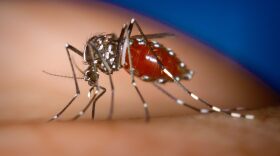A child on Oʻahu has been confirmed to have a case of measles. While health officials are hoping we don't see an outbreak, they are concerned because Hawaiʻi's vaccination rates have slipped.
Dr. Jim Ireland, director of the Honolulu Emergency Services Department, spoke to The Conversation about the guidance the department is giving to first responders and the public.
What can you tell us about previous measles cases in Hawaiʻi?
DR. JIM IRELAND: Measles is rare, and in the 20 or 25 years I've been here as a medical director and with the airports previously, I personally only saw two cases come through the airport, and both were adult males from Japan who were either unvaccinated or under-vaccinated. They came infected. They had the rash, they had a 105 fever. One was sick enough he had to go to the hospital. The other was not that sick, and I believe the Health Department quarantined him in a hotel somewhere, and these, again, in 20, 25 years were the only two cases I can recall coming through the airport.
And the current case?
IRELAND: When I heard about this case, the governor actually called me. It was startling, but not necessarily surprising, because we're hearing about measles outbreaks... It was a child who had come, I think, back to Hawaiʻi from another country... He came in, I guess, and was here a little while, then became sick, and had some contact with people in the community. So there's definitely an epidemiological investigation that the Health Department has to do, but as far as what EMS did, we didn't have contact with this patient. But it was a good opportunity for us to look at our own policies and procedures, and we did send out a special notice to our paramedics just to discuss measles and remind them again, because it's so rare, what it looks like, how to protect yourself. And really the PPE (personal protective equipment) does help, but the best protection is vaccination.
The Hawaiʻi Department of Health said people may have been exposed to measles if they visited these locations during the specified times:
- Daniel K. Inouye International Airport in Honolulu
- C gates, customs and baggage claim area on March 30 from 10:50 a.m. to 2 p.m.
- Terminal 2 departures, TSA checkpoints, and the gate area for Delta flight 309 to Atlanta, Georgia, on April 4 from 1 p.m. to 7 p.m.
- Mānoa Valley District Park art class on April 1 from 9 a.m. to 10 a.m.
- Queen’s Island Urgent Care Kapahulu on April 4 from 8 a.m. to noon
Is measles a highly contagious disease?
IRELAND: It is, and you're contagious four days before you get the rash, and four days after you get the rash, roughly. So you may not know you're contagious, or your child when they're initially contagious, and you may be doing things with other kids and other people, and so that's the concern. So very highly transmissible, but really only a major concern in people who aren't vaccinated. But because most children don't get vaccinated till they're 1 or a little older than 1, the real youngsters under 1 years old aren't vaccinated, and there's a risk for them as well when you do have widespread transmission in the community, which hasn't been the case. We haven't seen a case in Hawaiʻi in two years.

What guidance are you giving to first responders?
IRELAND: If they see something, they're going to need to let the ERs (emergency rooms) know before they get there that they're coming in with a suspected measles, because that person should be put in a special area of the hospital without contact with anybody else. They call it respiratory isolation, what we do for TB (tuberculosis) and other respiratory illnesses so there isn't risk of infection. So we definitely want to let the hospitals know ahead of time, and then they need to have their own PPE, and everybody, not only first responders, should inquire or reflect on their own vaccination status. And if they're not sure, ask their physician or primary care provider to check titers. And it's really that easy, and then if the titers are low, get a vaccine. And really the concern is with folks mostly who are against vaccines or don't want to get vaccines for whatever reason. Those are the ones who are most susceptible, including their children, because if they do come in contact with somebody with the measles, they'll probably get it.
What other information can you share with the public?
IRELAND: Not everybody can get the MMR vaccine — measles, mumps, rubella, which is the measles vaccine. It is a live virus, so people with immunodeficiency [or] are pregnant, shouldn't get the virus, so you always want to check with your doctor, primary health care provider, to make sure you can get the vaccine. But there's regular schedules, and people should follow those. But I think if the Health Department does offer these extra clinics, maybe for folks who weren't born and raised here, didn't have access to vaccines, I think it's just a fantastic idea... And it's a preventable disease and that's the sad thing, if people get sick, and especially if people get really sick and die, that it is a preventable disease. And once you get it, there's really no satisfactory treatment once you start showing symptoms and you're sick. There is some stuff that maybe can help if you were just exposed. But once you're sick, you're kind of stuck with it, and it's just supportive care.
To learn more about measles from the DOH, click here.
This interview aired on The Conversation on April 10, 2025. The Conversation airs weekdays at 11 a.m.





